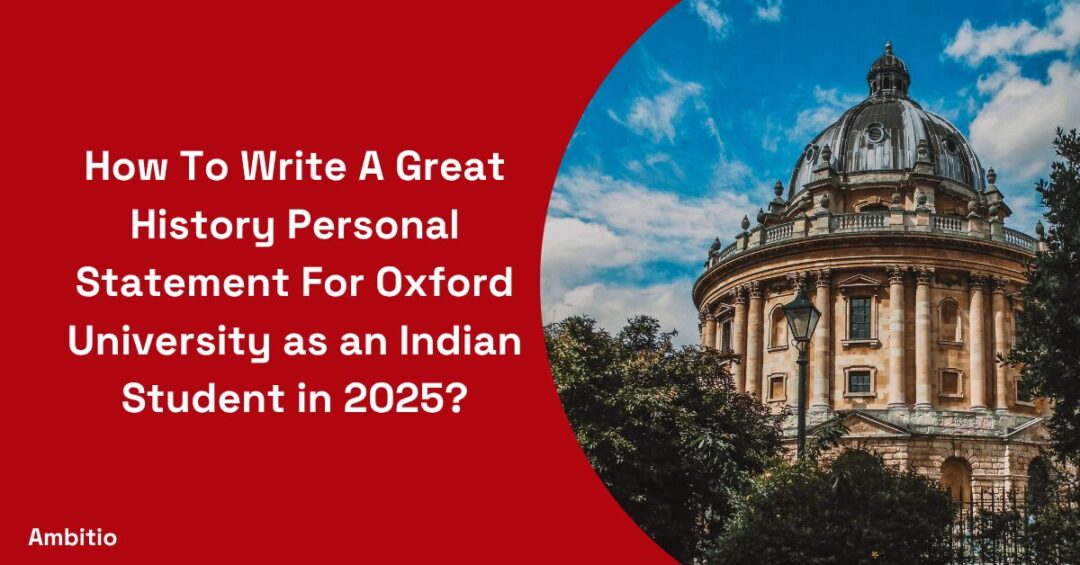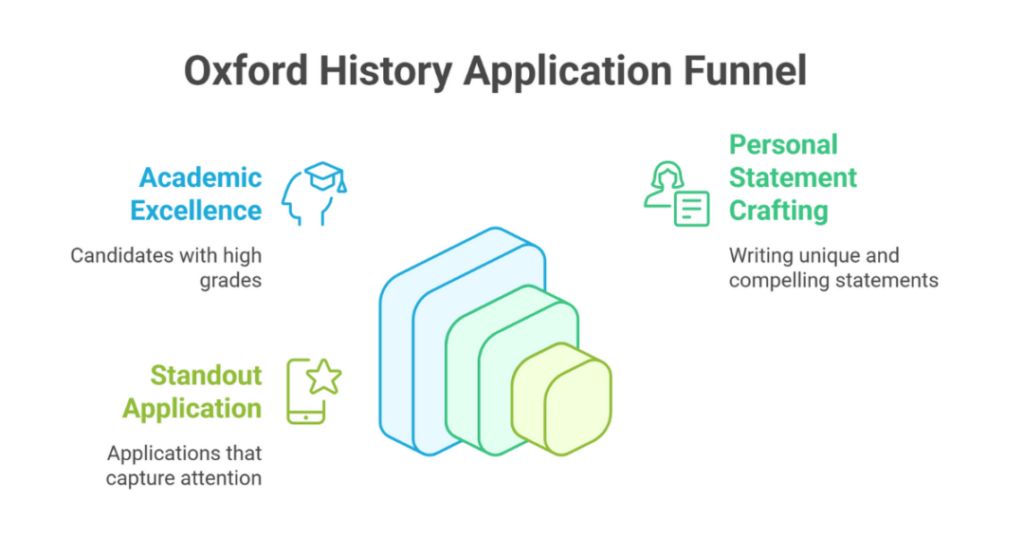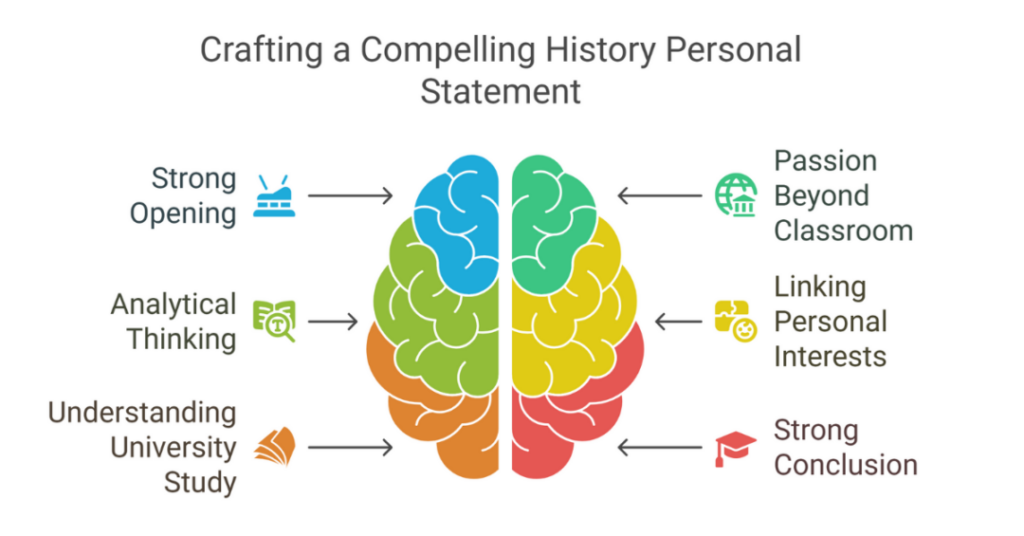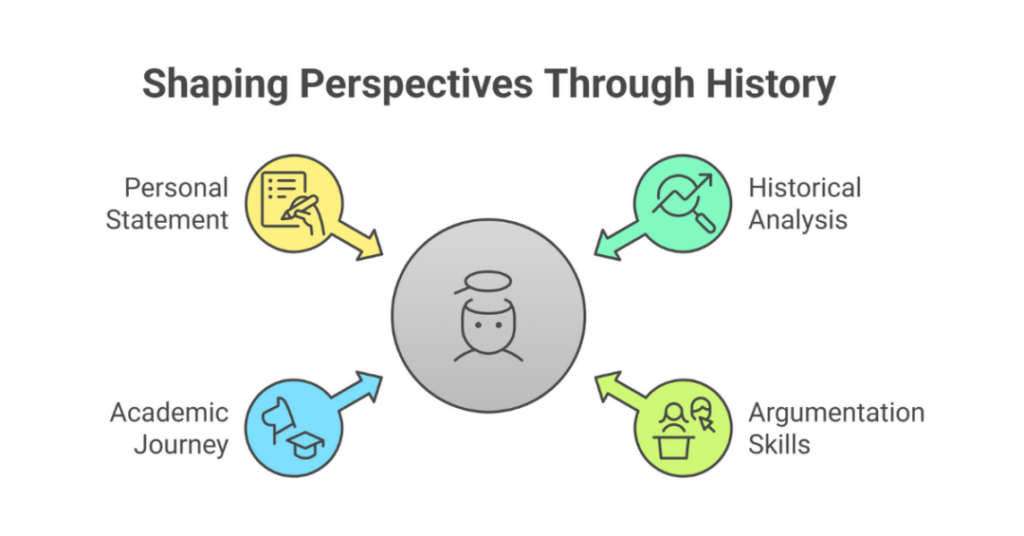26 June 2025
9 minutes read
How To Write A Great History Personal Statement For Oxford University as an Indian Student in 2025?

Key Takeaways
- History personal statement Oxford applicants must demonstrate deep analytical thinking, critical engagement with historical texts, and original perspectives.
- History personal statement Oxford should reflect intellectual curiosity, clarity of thought, and an ability to connect historical events to broader contexts.
- History personal statement Oxford evaluators seek evidence of independent reading, passion for history, and readiness for academic rigor.
Only 9% of candidates secure a place to study history at Oxford—making it one of the most competitive courses in the world.” That’s the reality.
You’re up against some of the brightest minds, all with stellar grades and a deep love for history. But here’s the catch—grades alone won’t cut it. Your history and personal statement is what make or breaks your application.
It’s your one shot to convince admissions tutors that you’re not just another candidate but someone who truly deserves a place at Oxford.
And yet, this is where most candidates fail. They write generic, cliché-ridden statements, thinking that listing books they’ve read or casually mentioning a volunteer role at a museum will impress.
It won’t. University Of Oxford isn’t looking for students who “like” history—they want those who live and breathe it. So, how do you craft a personal statement that not only stands out but makes an admissions tutor stop and think, “This person needs to be here”? Let’s break it down.
How A History Personal Statement Can Help You Enhance Your Chances Of Admission at Oxbridge?
Two candidates. Same grades. Same extracurriculars. Same drive for history. One gets into Oxford, the other doesn’t. Why? It all hinges on one document—your history of art personal statement. You can’t butter them up with straight A’s or a few months of work experience.
The tutors at Oxford and Cambridge don’t want students who “enjoy” history. They want students who think like historians—analytical, curious, and motivated. If your personal statement doesn’t yell that, you’re out.

Here’s how a killer history statement of purpose and personal statement can enhance your chances of admission:
1. Proves You’re Not Just Another Applicant
Thousands aspire to pursue the study of history at Oxbridge, whilst only a few really stand out. A good personal statement distinguishes you by displaying your individual spin on the reading of history.
Rather than detailing all the books that you have read, emphasize how history informs your mind, how it tests your assumptions, and why you are addicted to it outside the classroom.
2. Demonstrates Your Intellectual Preparation for a History Degree
The Oxford and Cambridge history course is tough. They want students to think critically, source critically, and argue like a proper historian.
Your personal statement must mirror this. If you show analytical thought in your writing—maybe by explaining a historical controversy or disputing a common myth—it indicates you are prepared for the rigour of elite university tutorials.
3. Shows You Love History outside School
Caring about history is not enough. Oxford demands evidence. What has been your out-of-school activity that has encouraged you to pursue history? Have you listened to lectures, participated in debates on history, or carried out independent research?
Better still, have you written on history, handled historical archives, or gained work experience in a relevant area? The more concrete the evidence of enthusiasm that you put in, the better your application.
4. Combines Academic and Personal Insights
Oxbridge is not in the market for robots. They are seeking students with intellectual depth but still a human touch. The greatest personal statements combine personal experiences, academic knowledge, and actual historical engagement in the real world.
If you’re able to connect a personal experience—perhaps a visit to a historical site or a vintage family letter—to your drive for history, it provides emotional strength to your application.
5. Demonstrates You Belong at Oxford or Cambridge
In the end, Oxbridge isn’t actually choosing students—they’re choosing future historians. An effective history SOP, resume and letter of recommendation persuades admissions tutors that you don’t merely desire a history degree; you want to be a part of their intellectual sphere.
Top applicants demonstrate a profound comprehension of what sets these universities apart and express how they’ll be successful within its academe.
6 Crucial Elements Of A Postgraduate Personal Statement For Oxbridge History
Your personal statement is not so much why you’d want to study history—it’s how you demonstrate you’re already in your historian head.” If you’re applying for history, you must look past simply stating your affinity for history books.

A good history personal statement displays intellectual range, critical thinking, and a profound knowledge of the past. Oxbridge admissions are ruthless, and a bad statement will cost you dearly. So, how do you write a good one? These are the six key elements that can guide you there.
1. A Powerful Introduction That Hooks Oxbridge Tutors
You only have seconds to impress the admissions team. Beginning with an interesting historical point of contention or a personal story connected to history at university makes your statement unique.
Perhaps it was reading ‘The Decline and Fall of the Roman Empire’ which moulded your insight into history, or visiting Ypres that added depth into understanding historical epochs. Whichever, ensure your beginning is attention-grabbing and conveys your intellectual involvement.
2. Clear Passion for History Beyond the Classroom
Oxfordshire isn’t concerned whether you achieved an A* or a high GPA in your GCSE or are rocking your level history coursework. What they need to see is that you’re interested in history beyond the classroom.

Have you been to historic locations, spoken in a debating society, or produced an EPQ on a niche historical subject? If you’re lucky enough to have conducted independent research, flaunt it—it indicates real dedication.
You can even include test scores like IELTS, TOEFL, GRE and SAT as well.
3. A Demonstration of Analytical Thinking
History is not memorizing dates; it’s assessing sources, challenging viewpoints, and making informed conclusions. Demonstrate how you’ve critically read historical accounts—be it Stalin’s actions, the part ideology plays in revolutions, or how history informs us about the world.
Applying this to your university studies, like a thesis you argued in an English literature essay, demonstrates that you possess excellent analytical abilities.
4. Connecting Personal Interests with Academic Studies
Oxbridge tutors want to see how your personal interests connect to academic studies. If you’ve enjoyed reading about the collapse of empires, how does that shape your approach to studying history and politics?
Maybe you’re fascinated by the impact of law on historical change—connecting this to a law personal statement or legal case study could add depth to your argument.
5. A Realistic Understanding of Studying History at University
A generic “I love history” won’t do. Instead, demonstrate you know what it takes to study at Oxford or Cambridge.
List parts of the Oxbridge history course that you’re especially interested in—whether it’s the tutorial system, exposure to original historical documents, or the possibility of immersing yourself in historical background. Demonstrating you have an understanding of the academic rigour and how you’ll structure your studies proves you’re up to the challenge.
6. A Strong Conclusion That Leaves a Lasting Impression
Your final paragraph must encapsulate your enthusiasm and look towards the future of the next couple of years. State how you wish to widen your horizons, cultivate your intellectual curiosity, and interact with like-minded historians.
If you have participated in mentoring junior students, being head boy, or university-level research, explain how such activities have equipped you for university studies.
3 Personal Statement Examples That Had Work For Most Of The Aspirants at UCAS
Every year, thousands of students craft their UCAS personal statements, hoping to secure a place at top universities. But most fail. Why?
“Actually, most statements are similar in tone—formulaic, unoriginal, and without any real engagement with the past. If you’re trying to get into Oxbridge, your statement must be more than a list of books and accomplishments. It must show why history is important to you, how it has helped you make sense of our world today, and what makes you unique.”

Below, we dissect three similar personal statements that actually succeeded—and teach you how to do the same when crafting a personal statement.
A Passion for History Beyond the Classroom
“History is not merely about the past—it is about the forces that shape humanity today.” From learning about ancient civilizations to examining contemporary political movements, history has never been merely a subject to me; it’s a key to cracking the codes of our world.
When I started writing my personal statement, I needed to make it something truly reflective of my passion for the study of historical stories and their effects on the world.
My path in history began in sixth form, where I soon discovered that history was more than learning dates but rather the application of critical thinking and analytical skills.
This awareness brings with it a greater depth of purpose to my studies, as I learned about subjects from revolutions to political ideologies. History also allowed me to immerse myself in the varied perspectives, fuelling my enthusiasm for research and debate.
Throughout my university applications, I have emphasized showing how I am able to think academically, critique historical arguments, and work independently.
I’ve done multiple drafts of my statement to make sure that all arguments are presented well and represent my development as a historian. In the future, I would like to continue developing these skills at university and eventually in postgraduate study, where I can make a positive contribution to historical scholarship.
History as a Means to View Humankind
“To know the here and now, one must first understand the then.” My interest in history is not about learning what has occurred—it’s learning why things have happened the way they have and how they continue to influence humanity today.
When I started writing my SOP, I wanted it to highlight my capacity for dissecting historical patterns and challenging conventional narratives more than simply regurgitating facts.
In sixth form, I investigated how past events shape contemporary ideologies, specifically through my extensive study of political change in the post-war era. History also pushed me to think more critically and look past surface-level readings.
I’ve spent time developing my analytical writing style, going through multiple drafts to engage my thoughts in a clear and concise manner.
My historical interest goes beyond the classroom, influencing how I engage with current affairs and public debates. Throughout my university applications, I would like to translate this intellectual passion into academic study.
In the long term, I would like to engage in postgraduate research, employing history as a means of understanding the world and influencing fruitful debates regarding society’s future.
The Power of History in Shaping Perspectives
“History is more than a subject—it’s a way of thinking.” The power of being able to analyze historical occurrences, reveal patterns, and know the purposes behind actions has fueled my passion for the discipline.
While crafting my personal statement, I have endeavored to demonstrate my profound involvement in history as a dynamic field of study rather than a fixed ledger of the past.
My academic experience in sixth form enabled me to cultivate a systematic method of historical analysis, the balance between breadth and depth of study. History also provided me with the chance to hone my argumentation skills, especially in my independent work, where I analyzed historical accounts and their political consequences.
Redrafting multiple versions of my personal statement permitted me to clarify how history has conditioned my perspective and intellectual aspirations.
Outside of university, I will be continuing to work towards history. I may do this through postgraduate study or interdisciplinary research but would like to try and understand how history can contribute to making sense of current societal issues.
My applications to university are more than wanting to study history but being prepared to make a contribution to its continued discussion and applicability within the world we live in.
Leading UK Universities Other Than Oxford for International Applicants
Assume that only Oxford and Cambridge are on the cards? Think twice. The UK has a number of world-class universities that provide excellent academics, excellent graduate employability, and international standing.
Let’s take a brief look at 12 leading UK universities (excluding Oxbridge), along with their average international tuition fees and estimated graduate starting salaries:
| University | Average Tuition Fees (GBP/year) | Avg. Graduate Salary (GBP/year) |
|---|---|---|
| Imperial College London | £35,100 | £39,000 |
| University College London (UCL) | £28,000 | £35,000 |
| London School of Economics (LSE) | £25,272 | £38,000 |
| University of Edinburgh | £27,500 | £33,500 |
| University of Manchester | £25,000 | £32,000 |
| University of Bristol | £24,600 | £31,500 |
| University of Glasgow | £22,000 | £30,000 |
| University of Warwick | £26,000 | £34,000 |
| University of Leeds | £21,750 | £30,500 |
| University of Birmingham | £22,500 | £30,000 |
| King’s College London | £27,000 | £33,000 |
| University of Southampton | £20,500 | £29,000 |
These universities combine academic prestige, global employability, and vibrant campus life—making them excellent choices for international students looking to study in the UK.
Conclusion
Deep down, a SOP is not about demonstrating how much you’ve read or cataloging all the things you’ve accomplished. It’s about demonstrating what you believe. That you question, question assumptions, and interact with ideas in ways that transcend simply liking history.
Too many applicants attempt to fit into a mold, writing what they believe will impress. But academic officers aren’t searching for the most rounded applicant—they’re looking for the most truly curious one.
If your statement sounds like it could have been produced by anyone, it’s already lost its punch. So, choose Ambitio and make your application stand out.
FAQs
What makes a strong history personal statement Oxford worthy?
A strong history personal statement Oxford worthy includes critical thinking, relevant reading, and original interpretation. The history personal statement Oxford should reflect intellectual maturity.
How long should my history personal statement Oxford application be?
Your history personal statement Oxford must follow the UCAS 4,000-character limit. An effective history personal statement Oxford uses this space to show depth and academic potential.
What should I avoid in my history personal statement Oxford draft?
In your history personal statement Oxford, avoid clichés, vague enthusiasm, and overused phrases. A refined history personal statement Oxford relies on evidence-based passion and insight.
Should I include specific historians in my history personal statement Oxford?
Yes, referencing historians in your history personal statement Oxford demonstrates critical engagement. A well-researched history personal statement Oxford connects your thoughts to scholarly debates.
Can personal experiences enhance a history personal statement Oxford submission?
Yes, personal insights can enrich your history personal statement Oxford if tied to academic reflection. A compelling history personal statement Oxford links lived experience with scholarly inquiry. Your history personal statement Oxford should show how your background shaped your intellectual growth.
How much reading should I reference in my history personal statement Oxford?
A strong history personal statement Oxford includes thoughtful engagement with books, not just titles. Referencing relevant reading in your history personal statement Oxford shows initiative. Your history personal statement Oxford must connect reading to analysis, not just mention it.
Do Oxford tutors expect originality in a history personal statement Oxford essay?
Originality in your history personal statement Oxford is crucial—think beyond classroom material. Your history personal statement Oxford should present independent perspectives and unique angles. A memorable history personal statement Oxford stands out through fresh, analytical thinking.

You can study at top universities worldwide!
Get expert tips and tricks to get into top universities with a free expert session.
Book Your Free 30-Minute Session Now! Book a call now




























